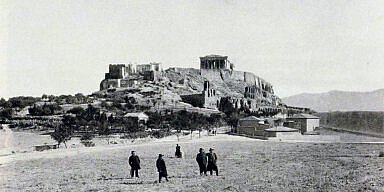December 10, 1963: Greek poet, Giorgos Seferis delivers his acceptance speech for the Nobel Prize in literature at the Nobel Banquet, City Hall in Stockholm.
Seferis was born in Urla, known in Greek as Voula, near Smyrna, Asia Minor, in 1900. After being schooled in Smyrna and then Athens, his family moved to Paris in 1918. Moving back to Athens in 1925, Seferis was admitted to the Royal Greek Ministry of Foreign Affairs and held several diplomatic posts including Royal Greek ambassador to the United Kingdom from 1957 to 1961.
During his travels with the diplomatic corps, he continued his passion for literature and writing. His main themes included alienation, wandering, and death, with an awareness of Greece’s past as it reflects her present. Many of his writings were poems, essays, and translations of other writers, such as T.S. Eliot and other American, English, and French poets.
In 1963 he was awarded the Nobel Prize for Literature, the prize motivation being, “for his eminent lyrical writing, inspired by a deep feeling for the Hellenic world of culture.” He was the first Greek to receive the prize. On December 10th of that year, during his acceptance speech, he stated, “When on his way to Thebes, Oedipus encountered the Sphinx, his answer to its riddle was: ‘Man.’ That simple word destroyed the monster. We have many monsters to destroy. Let us think of the answer of Oedipus.”
Serefis also took a stand against the Greek Regime of the Colonels, known as the Junta, and made a statement on the BBC, which was distributed in every newspaper in Athens proclaiming, “This anomaly must end.” He died in Athens on September 20, 1971, before seeing the end of the Junta, and at his funeral, thousands followed the funeral possession, singing Mikis Theodorakis’ song set to Seferis’ poem, “Denial.”
Serefis’ legacy in Greece and throughout the world is huge, including writer, Stephen King, who quoted several of Seferis’ poems in epigraphs to his 1975 novel, “Salem’s Lot.”



